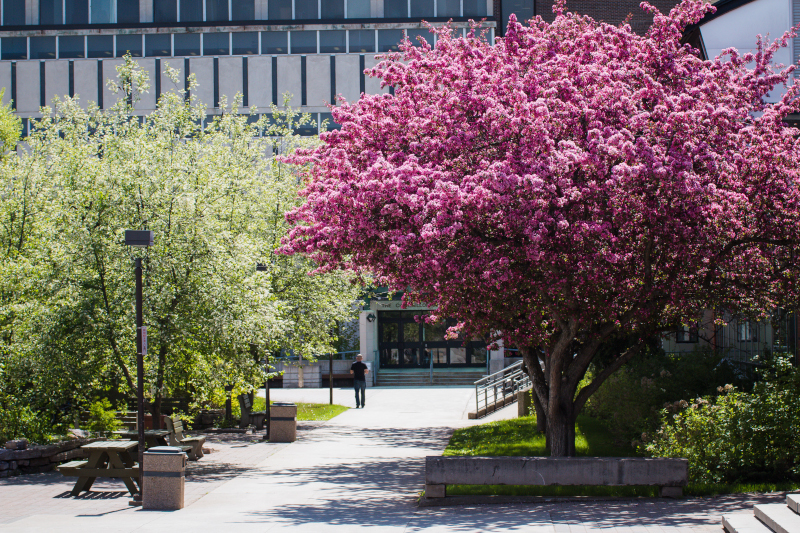Lakehead professors awarded $500,000 for important research
May 28, 2020 – Thunder Bay, Ont.
Two Lakehead University professors have been awarded $250,000 each from the federal New Frontiers in Research Fund – Exploration to pursue important work that will benefit Canada and beyond.

Dr. Zubair Fadlullah, associate professor in Computer Science and Research Chair at the Thunder Bay Regional Health Research Institute, is receiving $250,000 over two years to investigate the use of drones to address the lack of reliable internet access and health-care connectivity in rural areas in Northern Ontario.
The aim of this research is to address both the urban-rural digital and health-care gaps in an interdisciplinary manner.
“Connectivity is a key enabler for providing smart health care by monitoring and managing physical/mental health conditions and addiction trends,” Dr. Fadlullah wrote in his research proposal.
To tackle the digital divide issue, this research will use a robust communication infrastructure by leveraging Unmanned Aerial Vehicles such as drones, equipped with communication and energy harvesting modules as well as robotic arms, to form an agile network.
To address the healthcare gap in Northern Ontario, the drone-aided network, coupled with cost-effective device-to-device relays composed of smartphones, will offload the health data collected by Internet of Things and wearable devices deployed at the remote communities.
Dr. Fadlullah will carry out the research at two locations: the preliminary research investigation and experiment will occur at a Lakehead University research lab and the field experiment will be carried out at one of the Keewaytinook Okimakanak First Nations communities.
He will work with co-principal investigator Dr. Vijay Mago, an associate professor in Computer Science at Lakehead who is assisting with data analytics, and with co-applicant Keewaytinook Okimakanak eHealth Telemedicine, which will provide insight as they work toward implementing a successful solution.

Dr. Maryam Ebrahimi, assistant professor in Chemistry and Tier 2 Canada Research Chair in Low-Dimensional Nanomaterials, is receiving $250,000 over two years to address the enduring mystery of life’s origin in the cosmos.
In collaboration with her co-applicants at the Technical University of Munich, Dr. Ebrahimi and her team will study the peptide bonds formation from non-amino acid reactants under ultra-high vacuum (UHV) conditions, which resembles outer space.
“If peptide bonds are formed from a non-amino acid pathway under controlled UHV conditions, can amino acids still be assigned as the unique evolutionary path of the origin of life?” Dr. Ebrahimi wrote in her research proposal. This question frames her motivation for the project.
In her newly established Nanoscale Science Laboratory, her team will investigate the on-surface reactions of suitable reactants, identified in an interstellar medium, for the synthesis of peptide bonds.
“This project will have a critical impact on our understanding of the origin of life in extraterrestrial environments.” Dr. Ebrahimi emphasized.
“Congratulations to Drs. Ebrahimi and Fadlullah for receiving these grants and thank you to the Government of Canada for recognizing the important work of our researchers,” said Dr. Andrew P. Dean, Lakehead’s Vice-President, Research and Innovation.
New Frontiers in Research is a highly competitive tri-agency program designed to support groundbreaking interdisciplinary research.
In 2019/20, Lakehead University will receive nearly $2 million in assistance from the Research Support Fund to support the indirect costs of research, which includes costs for supporting the management of intellectual property, research and administration, ethics and regulatory compliance, research resources, and research facilities.
Title: Drone Aided Device-to-Device Networks for Communications and Health Connectivity in Remote Northern Ontario
Total amount awarded (over two years): $250,000
Grantee
Zubair Fadlullah,
Lakehead University, Computer Science
Co-principal Investigator
Vijay Mago,
Lakehead University
Co-applicants
Mohamed Elmokadem,
Keewaytinook Okimakanak Tribal Council (Northern Chiefs)
Cheryl Bechard,
Keewaytinook Okimakanak
Collaborator
Supuneet Bismil, Department of Psychiatry, Northern Ontario School of Medicine, Canada
Title: Revisiting the pathway to the origin of life - Peptide bond formation from non-amino acid reactants
Total amount awarded (over two years): $250,000
Grantee
Maryam Ebrahimi,
Lakehead University, Chemistry
Co-applicants
Johannes Barth,
Technical University of Munich
Wilhelm Auwarter,
Technical University of Munich
– 30 –
Media: For more information or interviews, please contact Brandon Walker, Media, Communications and Marketing Associate, at (807) 343-8177 or mediarelations@lakeheadu.ca.
Lakehead University is a fully comprehensive university with approximately 9,700 full-time equivalent students and over 2,000 faculty and staff at two campuses in Orillia and Thunder Bay, Ontario. Lakehead has 10 faculties, including Business Administration, Education, Engineering, Graduate Studies, Health & Behavioural Sciences, Law, Natural Resources Management, the Northern Ontario School of Medicine, Science & Environmental Studies, and Social Sciences & Humanities. In 2019, Maclean’s 2020 University Rankings, once again, included Lakehead University among Canada’s Top 10 primarily undergraduate universities, while Research Infosource named Lakehead 'Research University of the Year' in its category for the fifth consecutive year. Visit www.lakeheadu.ca.


